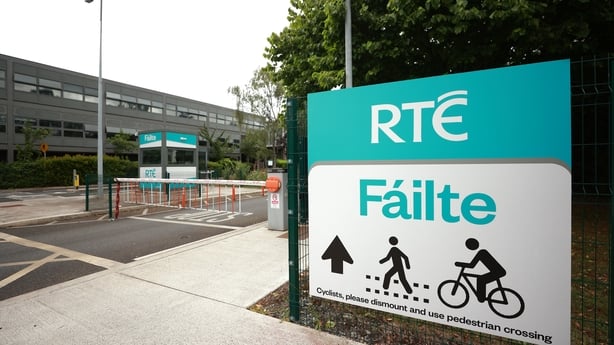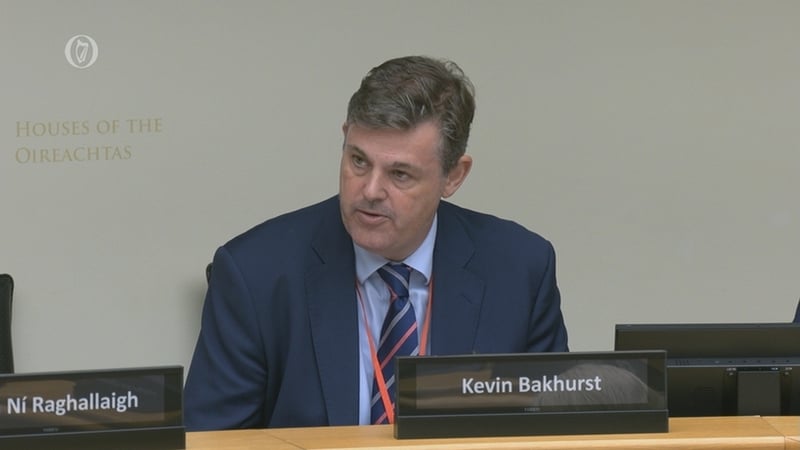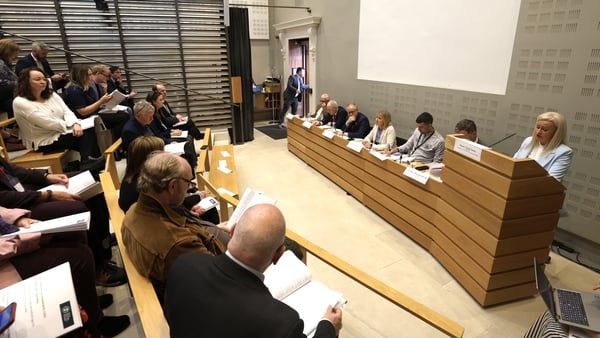RTÉ Director General Kevin Bakhurst has told an Oireachtas committee that claims that the national broadcaster is planning to "privatise" elements of its operations are "untrue".
Mr Bakhurst appeared alongside other RTÉ representatives before the Joint Oireachtas Committee for Tourism, Culture, Arts, Gaeltacht, Sport and Media.
He last week outlined to staff details of the broadcaster's plan, called 'A New Direction', which is to guide RTÉ for the next five years, with a firm emphasis on focusing on the digital era for public service media.
The document included proposals to move programmes such as The Late Late Show and Fair City off site and potentially offer them for commissioning from independent sector production companies.
He said that it has been "a challenging year for the organisation" and noted the ongoing "fallout from the events of last year".
In his opening statement, Mr Bakhurst added that "the need to take corrective action has become very clear," and RTÉ's new strategic plan "is the best way forward".
"It is very important to be clear what this new strategy is, and what it is not," he told the committee. "I am aware that there are some allegations that our increased commitment to commissioned content is some form of privatisation of a public good. That is simply untrue."
"Working in partnership with the creative sector has been a long-standing obligation in the provision of public service media, both for RTÉ and TG4.
"Our intention to do more with the sector is reflective of national policy, our statutory obligations, and the recommendations of the Future of Media Commission report."
We need your consent to load this rte-player contentWe use rte-player to manage extra content that can set cookies on your device and collect data about your activity. Please review their details and accept them to load the content.Manage Preferences
Mr Bakhurst noted that many of RTÉ's "most-watched programmes, be it factual documentaries such as Birdsong or popular programmes such as Dancing with the Stars are made in partnership with the independent sector".
The broadcaster is "focused on delivering more of the kind of content that our audiences most value through a blend of in-house and commissioned content... This will allow us to strengthen the Ireland's creative production sector while protecting the unique public service that is RTÉ."
€400k RTÉ exit payment case now before WRC
Mr Bakhurst also confirmed that the case involving an individual whose potential exit package of around €400,000, which was raised by Chair Terence O’Rourke at a previous committee hearing, has gone through a process and is now with the WRC.
"We tried to reach a settlement, we couldn't do that, but we have ended up in the Workplace Relations Commission," Mr Bakhurst said.
Without confirming the individual involved, Mr Bakhurst added: "I don't like to give big pay outs but I have to work within Irish law."
The case, he said, is now before the WRC "because we were unable to do a deal early on", adding that RTÉ has taken legal advice throughout the process.
When it was put to Mr Bakhurst that he was speaking under privilege, he said that privilege "does not override potential criminal prosecution on confidentiality at the WRC".

He emphasised that the planned "reduction in staff numbers over the five years ahead will be achieved through a voluntary exit programme, with all relevant approvals".
Mr Bakhurst also said that "RTÉ’s most recent investigative report into horse welfare standards garnered significant reaction, including at an international level".
Fine Gael Senator Micheál Carrigy asked Mr Bakhurst what the €20m of interim funding was for, to which the Director General said that the funding - received yesterday - was to make up for a shortfall in TV licence revenue.
"It's about funding business as usual," he said, "and about making sure that we can maintain our public commitments in terms of delivery of programming".
A new CFO will arrive in September, he added.
Fine Gael TD Brendan Griffin asked how many people have been "dismissed" from RTÉ.
Five people have left the organisation in different ways, Mr Bakhurst said.
"Nobody has been dismissed," he conceded. "Believe me, there was some appetite in some cases."
Neither former DG Dee Forbes nor broadcaster Ryan Tubridy are taking legal proceedings against RTÉ as far as he is aware, Mr Bakhurst said.
Mr Bakhurst said that RTÉ has "all the information" for a register of interests for staff and are putting it together.
He wants to publish it "later this month".
"We are currently in discussions with the Data Protection Commission (DPC) on that, which we have some issues we need to resolve with them."
Job losses 'will not fall on lower paid staff' - Bakhurst
Mr Bakhurst also told the committee that it would not be the case that lower paid staff would be impacted by job losses, adding that no other large redundancy packages are being negotiated and it is his full intention for that situation to never arise again.
Questioned this evening by Sinn Féin's Imelda Munster, who had noted discussion around the new strategy and job losses impacting lower paid workers, Mr Bakhurst said it would not be the case that lower paid staff would be impacted.
It "absolutely will not fall on lower paid people. In fact, there are a number of senior people who would be part of the plan to exit", he said, adding that it would be voluntary.
Asked if there are any other exit packages in train, he said: "There are no other ones and I don't intend for there to be any other ones."
RTÉ union to outline staff's concerns over new strategy
The RTÉ Trade Union Group (TUG) will write to the Oireachtas Committee on Media to outline staff's significant concerns at elements of the organisation's new five-year strategy.
Joint Chair of the RTÉ TUG Emma O Kelly said that at a TUG meeting this afternoon, there was a lot of discussion with staff expressing anger and disappointment with the strategy.
She told RTÉ's Drivetime: "We felt an urgent need to communicate with the Oireachtas Committee on Media.
"Staff felt it was really important that politicians are very clear as to the views of ordinary workers in RTÉ."
Ms O'Kelly said that people were dismayed and described last week as a "watershed moment".
She added that staff were most concerned about privatisation and outsourcing, and have fears around both their jobs and the future of public service media.
She said that staff were also concerned that the Government is not on the side of staff, when this was the case last summer.
Ms O'Kelly added: "Now is the time if you’re a politician and you value public service media, now we really need you in our camp because of the very future of public service broadcasting in this country, and that is a very serious thing for the public."
Speaking on the same programme, Sinn Féin TD Mairéad Farrell said it was important to listen to the ordinary workers in RTÉ and take it from there.





